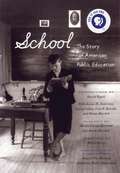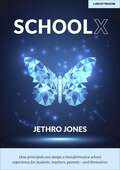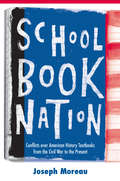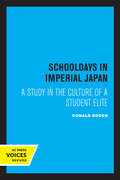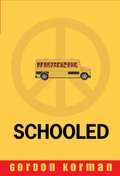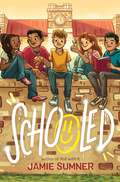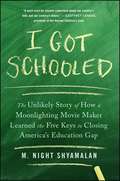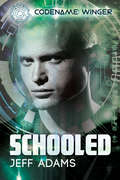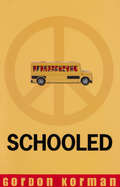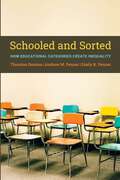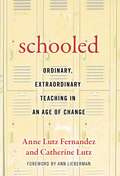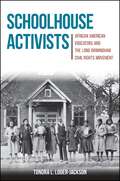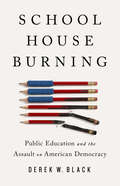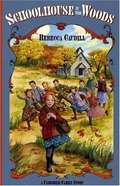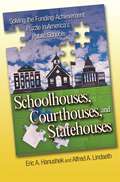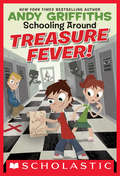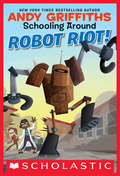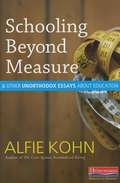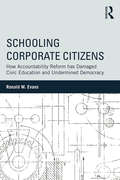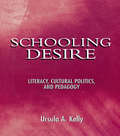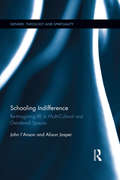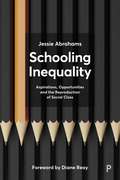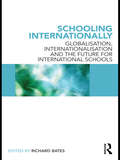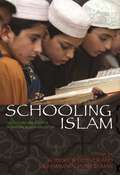- Table View
- List View
School: The Story Of American Public Education
by Meryl Streep Sarah Mondale Sarah Patton"This book takes you through the history of how the idea of public education began, to where we are right now. . . . It's so beautifully done, judiciously done, and I'm really proud to help it along." — Meryl Streep Esteemed historians of education David Tyack, Carl Kaestle, Diane Ravitch, James Anderson, and Larry Cuban journey through history and across the nation to recapture the idealism of our education pioneers, Thomas Jefferson and Horace Mann. We learn how, in the first quarter of the twentieth century, massive immigration, child labor laws, and the explosive growth of cities fueled school attendance and transformed public education, and how in the 1950s public schools became a major battleground in the fight for equality for minorities and women. The debate rages on: Do today's reforms challenge our forebears' notion of a common school for all Americans? Or are they our only recourse today? This lavishly illustrated companion book to the acclaimed PBS documentary, School, is essential reading for anyone who cares about public education.
SchoolX: How principals can design a transformative school experience for students, teachers, parents – and themselves
by Jethro JonesHow can we transform the school experience for all stakeholders? Jethro Jones has the answer: design thinking. SchoolX shows principals how to become designers, not just managers or leaders. It introduces readers to the design-thinking process, an iterative and innovative way to approach the challenges the school leader faces. Drawing on the wisdom of the dozens of leaders he has interviewed for his Transformative Principal podcast, Jones shows principals how to put themselves in the shoes of the people in their school communities, using that empathy to drive radical change. But, crucially, Jones argues that it is only once leaders improve their own experience that they can transform the experiences of others.
SchoolX: How principals can design a transformative school experience for students, teachers, parents – and themselves
by Jethro JonesHow can we transform the school experience for all stakeholders? Jethro Jones has the answer: design thinking. SchoolX shows principals how to become designers, not just managers or leaders. It introduces readers to the design-thinking process, an iterative and innovative way to approach the challenges the school leader faces. Drawing on the wisdom of the dozens of leaders he has interviewed for his Transformative Principal podcast, Jones shows principals how to put themselves in the shoes of the people in their school communities, using that empathy to drive radical change. But, crucially, Jones argues that it is only once leaders improve their own experience that they can transform the experiences of others.
Schoolbook Nation: Conflicts over American History Textbooks from the Civil War to the Present
by Joseph Moreau"A superior book. . . . Many readers will be surprised to see that today's arguments about history education follow the culture wars that go back to almost the beginning of the republic. Moreau's writing is engaging, with brilliant flashes of insight, as well as balance and wit. " -Gary B. Nash, Director of the National Center for History in the Schools Taking Frances FitzGerald's textbook studyAmerica Revisedas a point of departure, Joseph Moreau inSchoolbook Nationchallenges FitzGerald's premise that the 1960s were the beginning of the end of the glory days of American history education. Moreau recounts how in the late twentieth century, cultural commentators such as historian Arthur Schlesinger Jr. and politician Newt Gingrich preached that a new identity crisis had shaken American history in the sixties, and that the grand unified view of our past had given way to various interest groups, who dismantled the old national narrative while demanding a more "inclusive" curriculum for their children. Moreau discovered, however, that American history, while grand, has never been unified. Delving into more than 100 history books from the last 150 years, the author reveals that the efforts of pressure groups to influence the history curriculum are nearly as old as the mustiest textbook. "For those who would influence textbooks and teaching-Protestant elites in the 1870s, Irish-Americans in the 1920s, and conservative politicians today-the sky has always been falling," according to Moreau. Schoolbook Nationoffers a history lesson of its own: when the story of the past is written or rewritten, truth is often a victim. With its comprehensive treatment of the subjects of honesty and politics in the teaching of history, this is an essential book on the side of truth in a complex debate.
Schooldays in Imperial Japan: A Study in the Culture of a Student Elite
by Donald T. RodenThis title is part of UC Press's Voices Revived program, which commemorates University of California Press’s mission to seek out and cultivate the brightest minds and give them voice, reach, and impact. Drawing on a backlist dating to 1893, Voices Revived makes high-quality, peer-reviewed scholarship accessible once again using print-on-demand technology. This title was originally published in 1980.
Schooled
by Gordon KormanCapricorn Anderson has been homeschooled by his hippie grandmother, but when she has to stay in the hospital, Cap is sent to the local middle school. No education could prepare him for the politics of public school!
Schooled
by Jamie SumnerA bighearted, compulsively readable novel from acclaimed author Jamie Sumner about new schools, unexpected friendships, and overcoming loss.Eleven-year-old Lenny Syms is about to start college—sort of. As part of a brand-new experimental school, Lenny and four other students are starting sixth grade on a university campus, where they&’ll be taught by the most brilliant professors and given every resource imaginable. This new school is pretty weird, though. Instead of hunkering down behind a desk to study math, science, and history, Lenny finds himself meditating, participating in discussions where you don&’t even have to raise your hand, and spying on the campus population in the name of anthropology. But Lenny just lost his mom, and his Latin professor dad is better with dead languages than actual human beings. Lenny doesn&’t want to be part of some learning experiment. He just wants to be left alone. Yet if Lenny is going to make it as a middle schooler on a college campus, he&’s going to need help. Is a group of misfit sixth graders and one particularly quirky professor enough to pull him out of his sadness and back into the world?
Schooled
by M. Night ShyamalanIn this vital new book, the famed filmmaker tells how his passion for education reform led him to learn that there are five tested, indispensable keys to transforming America's underperforming schools.When he was scouting locations for a film, M. Night Shyamalan spent time in two Philadelphia-area schools--one a welcoming institution, the other a building with metal detectors, windows with bars, and locked classroom doors. The striking difference resonated with the filmmaker, convincing him to become more involved in education reform. Now, after years of dedicating himself to the issue and consulting with America's leading education experts and reformers, he has found something astonishing in the research. Schools are closing the achievement gap in poor neighborhoods all across the country, more than fifty of which are identified in Schooled. What they have in common are five distinct practices, similar to, and inspired by, the keys to a healthy lifestyle: Each one necessary, no one sufficient. These five, identified by the Shyamalan family foundation's researchers are: Longer Hours, whether an increased school day, or extended year; Small Schools; using evidence-tested teaching methods via Data-Driven Instruction; Leaders who spend their time on instruction instead of administration; and identifying and retaining the Best Teachers, including a fresh approach to the tenure system. Shyamalan embarked on this project with no preconceived notions, hoping only to learn which methods succeed. Working closely with experts, he has produced a book based solely on empirical data--a guide that should inform America's ongoing debate about how to improve our educational system.
Schooled (Codename: Winger #2)
by Jeff AdamsTheo Reese is a high school student who’s also a secret agent. Usually those lives are kept separate, but now he must be both at once. <p><p> Theo lends his expertise to his school’s computer science club as they gear up for a competition, but his talents are also required by the covert agency he works for. Someone has stolen an encrypted key that can allow them to control the nation’s energy grids. The possibilities are catastrophic unless Theo and his team can reclaim the file. <p> Theo locates the file in an unexpected place—the computer science competition. As Winger, his secret identity, he must recover the file and keep his teammates safe from the unscrupulous thieves…. But can he do it without revealing his secrets? He can’t blow his cover, especially with so many of his classmates around.
Schooled (Penworthy Picks Middle School Ser.)
by Gordon KormanIn this bestselling fish-out-of-water classic, a homeschooled kid must learn how to fit in at his new public school when he's elected to be class president as a prank. Capricorn Anderson (Cap for short) has never watched a television show. He&’s never tasted pizza. He&’s never heard of a wedgie. And he has never, even in his wildest dreams, thought he&’d live anywhere but the Garland Farm commune with his hippie grandmother and homeschool instructor, Rain. But all this changes when Rain is stuck in the hospital and Cap is sent to Claverage Middle School (dubbed C Average by the kids). Cap doesn't exactly fit in at school, with his long, ungroomed hair and hemp clothes; in fact, he's the biggest nerd around. But when he&’s elected eighth grade president as a joke, Cap is more puzzled than ever, and soon the joke grows into something more. Will Cap be the greatest president in the history of C Average or the biggest punch line? Rife with Gordon Korman&’s signature humor, Schooled is a heartwarming story about friendship, kindness, and finding your place—which may not always be where you think it is.
Schooled and Sorted: How Educational Categories Create Inequality
by Thurston Domina Andrew M. Penner Emily K. PennerSociety primarily views education as a way to teach students skills and knowledge that they will draw upon as they move into their adult lives. However, schools do more than educate students – they also place students into categories, such as kindergartner, English language learner, and honor roll student. But do these categories have larger consequences than simply sorting students into classrooms? In Schooled & Sorted Thurston Domina, Andrew M. Penner, and Emily K. Penner, explore how educational categories reify and reinforce powerful existing social categories – including race, ethnicity, and class – and ultimately reproduce social and economic inequality in broader society. Domina and colleagues argue that while education is often seen as a tool for social mobility and reducing inequality, categories used in schools shape students’ access to resources, which ultimately have far-reaching impacts on their lives. The authors assert that the classes students are sorted into influence their educational experiences – students who are placed in higher-tracked classes are believed to have stronger academic skills than students in lower-tracked classes. As a result, more resources are often devoted to students in higher-tracked classes. Because many measures of academic achievement reflect values of the status quo, white, affluent students are overrepresented in these track assignments, leading to a reproduction of societal status and resource inequality within schools. This inequality within schools translates into lasting inequalities in the adult world. Society views educational achievement to be based on merit – high achievers have done well because they worked hard and are rewarded with resources, status, and power, including high-paying, high-status jobs at prestigious organizations. Those with lower educational status, on the other hand, are seen as undeserving and are therefore sorted into lower-paid jobs in lower-status professions and hold less influence. Domina and colleagues contend, however, that while educational categorization is unavoidable, a more equitable system, and thus a more equitable society, can be built. A key component is to build and uphold categories that emphasize educational goods that are inherently valuable, such as the ability to read, as opposed to those that derive value from scarcity, such as status and prestige. Schooled & Sorted is an illuminating investigation into the ways sorting within schools translates to sorting – and inequality – into the larger world.
Schooled: Ordinary, Extraordinary Teaching in an Age of Change
by Catherine Lutz Anne FernandezDepicted variously as heroes, villains, or victims, America’s teachers find themselves at the center of a sometimes nasty policy debate. Yet, while politicians, reformers, and pundits contribute to the cacophony that serves as our national conversation about education, those who teach our children everyday are barely heard over the noise. This beautifully written book highlights working teachers speaking on many key educational problems under debate as well as many of the controversial solutions put forth, including revamped teacher evaluations, curricular standardization, and increased testing and data collection. Anthropologist Catherine Lutz and high school teacher Anne Lutz Fernandez traveled the country to meet a wide range of educators on the frontlines of teaching across diverse contexts―from traditional public schools to charters to the home school; early in careers and near retirement; in city, town, suburb, and country. What they learned about teaching and learning provides critical insights not just for educators but for anyone interested in American education.
Schoolhouse Activists: African American Educators and the Long Birmingham Civil Rights Movement
by Tondra L. Loder-JacksonSchoolhouse Activists examines the role that African American educators played in the Birmingham, Alabama, civil rights movement from the late nineteenth century to the present day. Drawing on multiple perspectives from education, history, and sociology, Tondra L. Loder-Jackson revisits longstanding debates about whether these educators were friends or foes of the civil rights movement. She also uses Black feminist thought and the life course perspective to illuminate the unique and often clandestine brand of activism that these teachers cultivated. The book will serve as a resource for current educators and their students grappling with contemporary struggles for educational justice.
Schoolhouse Burning: Public Education and the Assault on American Democracy
by Derek W. BlackThe full-scale assault on public education threatens not just public education but American democracy itself Public education as we know it is in trouble. Derek W. Black, a legal scholar and tenacious advocate, shows how major democratic and constitutional developments are intimately linked to the expansion of public education throughout American history. Schoolhouse Burning is grounded in pathbreaking, original research into how the nation, in its infancy, built itself around public education and, following the Civil War, enshrined education as a constitutional right that forever changed the trajectory of our democracy. Public education, alongside the right to vote, was the cornerstone of the recovery of the war-torn nation. Today's current schooling trends -- the declining commitment to properly fund public education and the well-financed political agenda to expand vouchers and charter schools -- present a major assault on the democratic norms that public education represents and risk undermining one of the unique accomplishments of American society.
Schoolhouse in the Woods (Fairchild Family Series, #2)
by Rebecca CaudillThe Fairchild family is here again and this time, Bonnie is old enough to begin the great adventure -- School! We join Bonnie in the excruciating anticipation of the first day, when she will wear her new dress, carry a first reader and slate, and -- displaying nonchalance as she braves the swinging bridge -- enter into the mysteries of schoolroom learning and playground rites in a woodland setting of the early 1900s. Bonnie's older brother and three sisters, her various classmates and Miss Cora, her teacher, add their liveliness to an eventful season of learning -- on every front -- in the Kentucky Hills.
Schoolhouses, Courthouses, and Statehouses: Solving the Funding-Achievement Puzzle in America's Public Schools
by Eric A. Hanushek Alfred A. LindsethImproving public schools through performance-based fundingSpurred by court rulings requiring states to increase public-school funding, the United States now spends more per student on K-12 education than almost any other country. Yet American students still achieve less than their foreign counterparts, their performance has been flat for decades, millions of them are failing, and poor and minority students remain far behind their more advantaged peers. In this book, Eric Hanushek and Alfred Lindseth trace the history of reform efforts and conclude that the principal focus of both courts and legislatures on ever-increasing funding has done little to improve student achievement. Instead, Hanushek and Lindseth propose a new approach: a performance-based system that directly links funding to success in raising student achievement. This system would empower and motivate educators to make better, more cost-effective decisions about how to run their schools, ultimately leading to improved student performance. Hanushek and Lindseth have been important participants in the school funding debate for three decades. Here, they draw on their experience, as well as the best available research and data, to show why improving schools will require overhauling the way financing, incentives, and accountability work in public education.
Schooling Around #1: Treasure Fever!
by Andy GriffithsThe literary genius behind the NY Times best-selling THE DAY MY BUTT WENT PSYCHO is back--with an original school-based series created just for Scholastic! Meet Henry McThrottle, a fifth-grader at Northwest Southeast Central School. Henry has an extremely active imagination--sometimes it's hard to tell where his imagination stops and the real world begins. His flights of fancy lead to adventures of the sort only Andy Griffiths could dream up: always hilarious, never predictable, sure to keep kids laughing and reading!
Schooling Around #4: Robot Riot!
by Andy GriffithsThe fourth wacky book in Andy Griffith's new Schooling Around! series. Robots are running amok in Northwest Southeast Central school! It all started as a harmless science experiment meant to prove whether or not the new girl in school was in fact a robot. But now a robot of a different kind is chewing up the hallways and causing panic not seen in this area since Schooling Around #3! What are the students at Northwest Southeast Central going to do? RUN! And what are readers going to do? LAUGH!
Schooling Beyond Measure and Other Unorthodox Essays About Education
by Alfie KohnIn this collection of provocative articles and blog posts originally published between 2010 and 2014, Alfie Kohn challenges the conventional wisdom about topics ranging from how low-income children are taught, to whether American schools have really fallen behind those in other countries. Why, he asks, do we assume learning can be reduced to numerical data? What leads us to believe that "standards-based" grading will eliminate the inherent limitations of marks? Or that training students to show more "grit" makes sense if the real trouble is with the tasks they've been given to do?
Schooling Corporate Citizens: How Accountability Reform has Damaged Civic Education and Undermined Democracy
by Ronald W. EvansSchooling Corporate Citizens examines the full history of accountability reform in the United States from its origins in the 1970s and 1980s to the development of the Common Core in recent years. Based in extensive archival research, it traces the origins and development of accountability reform as marked by key government- and business-led reports—from A Nation at Risk to No Child Left Behind and Race to the Top. By using the lens of social studies and civic education as a means to understand the concrete impacts of accountability reforms on schools, Evans shows how reformers have applied principles of business management to schools in extreme ways, damaging civic education and undermining democratic learning. The first full-length narrative account of accountability reform and its impact on social studies and civic education, Schooling Corporate Citizens offers crucial insights to the ongoing process of American school reform, shedding light on its dilemmas and possibilities, and allowing for thoughtful consideration of future reform efforts.
Schooling Desire: Literacy, Cultural Politics, and Pedagogy
by Ursula A. KellyUrsula A. Kelly draws on radical theories of literacy, culture, identity and pedagogy to frame the culture of pedagogy as it relates to human desire. Examples from (auto)biography, classroom practices, and popular media provide the means by which the author highlights some of the pedagogical dilemmas facing literacy practices which often work to silence the cultural politics of identity and desire.
Schooling Indifference: Reimagining RE in multi-cultural and gendered spaces (Gender, Theology and Spirituality)
by Alison Jasper John I'AnsonThis book is concerned with re-imagining Religious Education (RE) as this is practiced in schools, colleges and universities throughout the UK and in a wide variety of international educational contexts. On the basis of a critical analysis of current theory and practice in RE the authors argue that this educational framing is no longer plausible in the light of new theoretical developments within the academy. A new educational approach to RE is outlined that challenges students to think and practice differently. This includes a ‘becoming ethnographer’ approach that can acknowledge socio-material relations and engage the broader literacies necessary for such study. Part One examines how RE has been constructed as a discipline in historical and spatial terms that abstract its study from material concerns. Part Two offers some new starting points: Spinoza, Foucault and feminist theory that differently foreground context and relationality, and 'Islam' read as a discursive, located tradition rather than as 'world view'. Finally, Part Three proposes a new trajectory for research and practice in RE, with the aim of re-engaging schools, colleges and universities in a dialogue that promotes thinking and practice that – as educational - is continually in touch with the need to be critical, open-ended and ethically justifiable.
Schooling Inequality: Aspirations, Opportunities and the Reproduction of Social Class
by Jessie AbrahamsDespite a mass expansion of the higher education sector in the UK since the 1960s, young people from socio-economically disadvantaged backgrounds remain less likely to enter university than their advantaged counterparts. Drawing on unique new research gathered from three contrasting secondary schools in England, including interviews with children from three year groups and careers advisors, this book explores the aspirations, opportunities and experiences of young people from different social-class backgrounds against a backdrop of continuing inequalities in education. By focusing both on the stories of young people and the schools themselves, the book sheds light on the institutional structures and practices that render young people more, or less, able to pursue their aspirations.
Schooling Internationally: Globalisation, Internationalisation and the Future for International Schools
by Richard BatesThe number of schools that call themselves international is growing exponentially. In addition many other schools are exploring the concept of international-mindedness and what that might mean in the contemporary world of globalisation. This book sets out to provide a critical perspective on current issues facing ‘international schooling’, particularly the conflict between ‘internationalising’ and ‘globalising’ tendencies and to explore these as they affect teaching and learning, curriculum, pedagogy and assessment as well as to explore the contribution international schools might make to the achievement of global citizenship. It is the first book to critically analyse the ambiguities, tensions and conflicts that face those involved with and researching, international schools and their role in global networking. Issues addressed include: the political economy of international schools (Hugh Lauder and Ceri Brown) their relations to global and local cultures, global markets and civil society (Richard Bates) the role of international schools in global networking (Michael Wylie) the micropolitics of such schools (Richard Caffyn) the growth complexity and challenges facing the International Baccalaureate (Tristan Bunnell) the future demands for and of teachers in international schools (Mary Hayden and Jeff Thompson) the nature of teaching and learning in international schools (Helen Fail) the problematic idea of an international curriculum (Jim Cambridge) issues facing international assessment (Richard Bates) the challenge of education for global citizenship (Harriet Marshall). This provocative book will be essential reading for those teaching in, leading and governing international schools in countries around the world, as well as those who contemplating entering the rapidly expanding world of international schooling.
Schooling Islam: The Culture and Politics of Modern Muslim Education (Princeton Studies in Muslim Politics #37)
by Robert W. Hefner and Muhammad Qasim ZamanSince the Taliban seized Kabul in 1996, the public has grappled with the relationship between Islamic education and radical Islam. Media reports tend to paint madrasas--religious schools dedicated to Islamic learning--as medieval institutions opposed to all that is Western and as breeding grounds for terrorists. Others have claimed that without reforms, Islam and the West are doomed to a clash of civilizations. Robert Hefner and Muhammad Qasim Zaman bring together eleven internationally renowned scholars to examine the varieties of modern Muslim education and their implications for national and global politics. The contributors provide new insights into Muslim culture and politics in countries as different as Morocco, Egypt, Pakistan, India, Indonesia, Iran, and Saudi Arabia. They demonstrate that Islamic education is neither timelessly traditional nor medieval, but rather complex, evolving, and diverse in its institutions and practices. They reveal that a struggle for hearts and minds in Muslim lands started long before the Western media discovered madrasas, and that Islamic schools remain on its front line. Schooling Islam is the most comprehensive work available in any language on madrasas and Islamic education.
